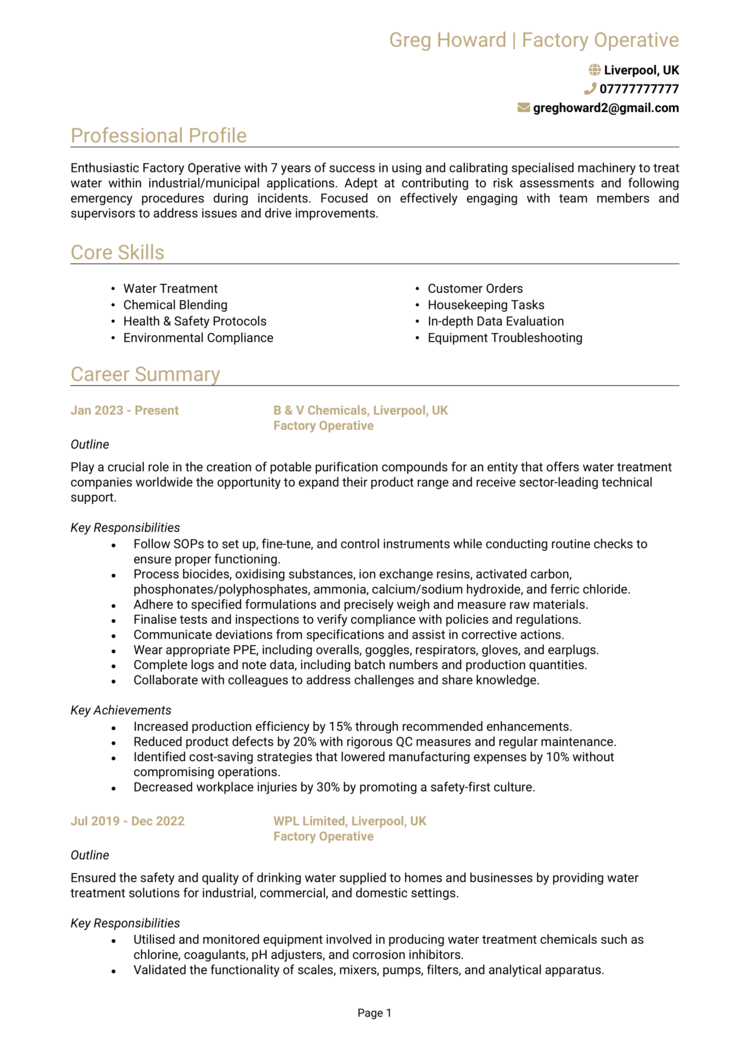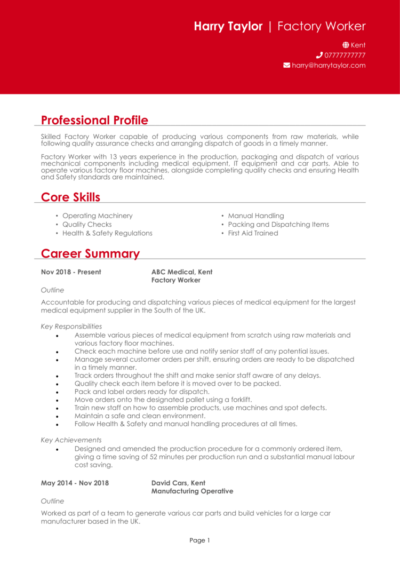As a Factory Worker, you’re the strong backbone of production, ensuring that goods are manufactured efficiently and safely. But before you roll up your sleeves and step onto the factory floor, you need to impress the recruiter with your CV.
This guide, complete with 3 Factory Worker CV examples, will show you how to craft a CV that highlights your skills, experience, and reliability to secure the role you’re after.
Factory Worker CV

Factory Operative CV

Food Production Operative CV

How to write your Factory Worker CV
Learn how to create your own interview-winning Factory Worker CV with this simple step-by-step guide.
Creating a Factory Worker CV that gets noticed means knowing exactly what recruiters want to see. Your CV should highlight your reliability, technical know-how, and ability to keep production running smoothly.
From laying out your skills to emphasising your experience with machinery and processes, this guide will help you build an application that stands out.
Factory Worker CV structure


Think of your CV like a production line – everything in its place, no wasted motion, and definitely no skipping steps. Recruiters need to see your reliability, efficiency, and technical know-how clearly.
Here’s how to structure your Factory Worker CV:
- Name and contact details – Keep these personal details at the top so employers can get in touch easily. Including a photo is optional.
- Profile – Start with a summary of your experience in manufacturing, your core skills, and your dedication to safety and quality.
- Core skills – Quickly highlight abilities like machine operation, quality control, and teamwork.
- Work experience – Detail your past roles in reverse chronological order, focusing on your contributions to production processes.
- Education – Go over academic qualifications and any relevant certifications.
- Additional info – You could optionally detail the hobbies and interests that showcase your reliability, teamwork, or technical skills.
Factory Worker CV format


Your CV should reflect the precision and order you bring to the factory floor. Remember, even highly capable candidates can get overlooked if their CV is hard to navigate. Avoid formatting mistakes that could cost you the job.
Here’s how to format your Factory Worker CV:
- Bullet points – Break up dense text to make your experience and skills easy to skim.
- Divide sections – Logically organise the information and make it easy to navigate.
- Use a clean font – Prioritise readability with a simple, professional font and tasteful design choices.
- Keep it the right length – No more than 2 pages. It’s the perfect length to cover the essentials without getting boring.
How to write a Factory Worker CV profile


Your profile is the first thing a recruiter will read, so it needs to pack a punch. For a Factory Worker, this is your chance to highlight your experience with production processes, machinery, and your commitment to quality and safety.
Factory Worker CV profile examples
Profile 1
Dedicated Factory Worker with four years of experience in manufacturing, specialising in operating assembly lines and ensuring quality control. Skilled in using industrial machinery and adhering to safety protocols to meet production targets efficiently.
Profile 2
Reliable Factory Worker with three years of experience in food production, adept at maintaining cleanliness, managing inventory, and packaging products. Proficient in following health and safety standards and working in fast-paced environments.
Profile 3
Experienced Factory Worker with over six years of expertise in automotive manufacturing, focusing on machine operation, troubleshooting, and meeting strict production deadlines. Skilled in maintaining equipment and ensuring compliance with ISO standards.
What to include in your Factory Worker CV profile
Here are some tips on what to include in your Factory Worker CV profile:
- Where you’ve worked – Mention factories, production plants, or warehouses where you’ve gained experience.
- Your top qualifications – Highlight certifications in areas like health and safety or machinery operation.
- Essential skills – Include abilities like working to tight deadlines, quality inspection, or operating heavy machinery.
- Types of machinery or processes – Note any specific equipment or production lines you’re familiar with.
- Work environments you’ve been in – Mention experience in fast-paced or high-volume environments.
Writing an effective core skills section


Your core skills section is like your toolbox – packed with everything you need to keep the production line moving smoothly.
For Factory Workers, this might include technical skills, attention to detail, and your ability to work efficiently under pressure. Tailor these to the job description by emphasising the skills most relevant to the role.
What are the most important skills for a Factory Worker CV?
- Machine Operation – Operating production machinery safely and efficiently.
- Quality Control – Inspecting products to ensure they meet company standards.
- Health and Safety Compliance – Following workplace safety regulations and procedures.
- Assembly Line Work – Collaborating with team members to maintain production flow.
- Inventory Management – Monitoring and managing stock levels for smooth production.
- Packaging and Labelling – Preparing products for distribution with accurate labels.
- Maintenance Support – Assisting with minor equipment repairs and reporting issues.
- Time Management – Working to tight deadlines without compromising quality.
- Heavy Lifting – Handling materials safely and adhering to manual handling protocols.
- Adaptability – Learning and applying new processes quickly to meet changing demands.
Work experience section


Your work experience section is where you prove your reliability and efficiency as a Factory Worker. Highlight the roles you’ve held, the tasks you’ve performed, and the impact of your contributions.
List your roles in reverse chronological order, focusing on the production processes you’ve supported and the results you’ve achieved.
How to structure jobs

- Outline – Provide a quick overview of the factory or production facility, your role, and the types of products or materials you worked with.
- Responsibilities – Highlight tasks like machine operation, quality inspection, or inventory handling. Use action verbs like “operated,” “monitored,” or “assembled.”
- Achievements – Include measurable results, such as improving efficiency, reducing waste, or meeting production targets. Numbers always make a stronger impression, so include them wherever possible.
Example jobs for Factory Worker
Factory Worker | Protech Ltd
Outline
Operated machinery on an assembly line in a manufacturing facility, focusing on quality control and meeting production quotas. Ensured adherence to safety and operational standards.
Responsibilities
- Operated and maintained assembly line machinery to produce high-quality components.
- Inspected finished products for defects, ensuring compliance with quality standards.
- Packaged and labeled items according to customer specifications.
- Monitored inventory levels of raw materials and reported shortages.
- Followed safety procedures to maintain a hazard-free workplace.
Achievements
- Increased daily production output by 15 percent through efficient machine operation.
- Recognised by management for maintaining a 100 percent quality compliance rate for six months.
- Reduced downtime by 10 percent by identifying and resolving machine issues promptly.
Factory Worker | Freshly Done Ltd
Outline
Worked in a food production factory, ensuring the safe handling and packaging of products. Maintained high cleanliness standards and adhered to health regulations.
Responsibilities
- Prepared raw materials for production, following strict hygiene protocols.
- Operated packaging machines to ensure products were sealed and labeled accurately.
- Monitored production lines to detect and resolve issues promptly.
- Performed cleaning and sanitisation of workstations and equipment regularly.
- Reported production data to supervisors, including output and waste levels.
Achievements
- Reduced product waste by 20 percent through careful monitoring of packaging processes.
- Achieved a 98 percent on-time delivery rate by consistently meeting production deadlines.
- Received recognition for maintaining exemplary cleanliness during health inspections.
Factory Worker | AutoParts Assembly Co.
Outline
Assembled automotive components on a production line, ensuring precision and consistency. Operated machinery and collaborated with team members to meet daily targets.
Responsibilities
- Installed and tested components to ensure proper assembly and functionality.
- Followed detailed blueprints and technical instructions for product assembly.
- Performed routine maintenance on machinery to prevent production delays.
- Recorded production metrics, including output and downtime, for performance tracking.
- Ensured compliance with ISO safety and quality standards.
Achievements
- Increased production efficiency by 15 percent by streamlining the assembly process.
- Reduced machine downtime by 10 percent through proactive maintenance and troubleshooting.
- Recognised by management for achieving zero defects in assembled components over three months.
Education section


The education section is important for showcasing any technical training or certifications relevant to factory work. Include health and safety qualifications, vocational training, and academic achievements.
This section is typically brief but impactful. List your qualifications in reverse chronological order, starting with the most recent.
Recommended qualifications for Factory Workers
- Level 2 Diploma in Manufacturing – Covers practical skills for manufacturing processes.
- Health and Safety in the Workplace Certification – Demonstrates knowledge of workplace safety regulations.
- Forklift Truck Operator Certification – Validates skills in safely operating forklift trucks.
- Basic First Aid Training – Provides essential first aid knowledge for workplace emergencies.
- NVQ Level 2 in Performing Manufacturing Operations – Offers training in production, assembly, and quality control techniques.





